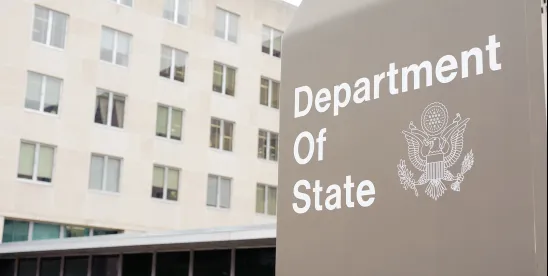The U.S. Department of State (DOS) announced July 25, 2025, a significant change to its interview waiver policy effective Sept. 2, 2025. This policy revision will require most nonimmigrant visa applicants to attend in-person consular interviews, altering the visa processing landscape for HR departments and legal teams. This change arrives following a rollback that began in February 2025, when DOS reduced the interview waiver window from 48 months to 12 months, and reflects a broader policy shift toward more rigorous screening and vetting of visa applicants at U.S. consulates abroad.
Interview Waivers Eliminated for Most Business Visa Categories
Under the new policy, interview waivers will be eliminated for virtually all business/employment visa categories, including:
- H-1B specialty occupation workers
- L-1 intracompany transferees
- E-1/E-2 treaty traders and investors
- O-1 individuals with extraordinary ability
- F-1 students
- J-1 exchange visitors
- All other nonimmigrant visa categories not specifically exempted
The policy eliminates the age-based exemptions that previously allowed applicants under 14 and over 79 to skip interviews. These populations will now face mandatory in-person interview requirements.
The policy also eliminates interview waivers for renewal applicants, meaning that foreign nationals with previously successful visa applications will need to appear for interviews when seeking renewals.
Remaining Interview Waiver Eligibility
The revised policy preserves interview waivers for a limited set of circumstances:
Diplomatic and Official Categories: Applicants for A-1, A-2, certain C-3, G-1 through G-4, NATO-1 through NATO-6, and TECRO E-1 visas, as well as other diplomatic or official-type visas.
B-1/B-2 Renewals with Strict Conditions: Tourist and business visitor visa renewals remain eligible for interview waivers, but only if the applicant meets all the following criteria:
- Renewing within 12 months of the prior visa’s expiration
- Applicant was at least 18 years old when the prior visa was issued
- Applying in their country of nationality or residence
- Has never been refused a visa (unless the refusal was overcome or waived)
- Has no apparent or potential ineligibility
Applicants who meet all waiver criteria remain subject to consular discretion, meaning officers may still require an in-person interview if they feel one is necessary. This discretionary authority means that no waiver is guaranteed.
Additional Procedural Changes
The interview waiver rollback is occurring alongside other significant procedural changes that may further complicate visa processing:
Enhanced Vetting Requirements: As of June 2025, F, M, and J visa applicants must set their social media accounts to “public” to facilitate government vetting processes, adding a layer of complexity to student and exchange visitor applications.
DS-160 Timing Requirements: New rules require that DS-160 forms be submitted at least two business days before scheduled visa interviews, with exact barcode-matching requirements that could lead to appointment cancellations for noncompliance.
No Transition Period: Unlike many policy changes that include grace periods, these restrictions are being implemented with little to no advance warning, so foreign national employees and employers should keep abreast of visa processing changes.
Operational Impact for U.S. Employers: Planning Considerations
These policy changes will create operational considerations for U.S. employers who rely on foreign talent.
Extended Processing Times: Employers may expect longer visa processing times as consulates worldwide prepare for increased interview volumes. Popular business immigration posts, such as those in India, China, Mexico, and Canada, that previously processed many applications without interviews, may face backlogs. Some consulates are already experiencing lengthy wait times, which may worsen.
Immediate Disruption for Pending Applications: Reports indicate that some applicants who were previously approved for interview waivers but haven’t yet received their visas are being turned away and required to reapply for in-person appointments. DOS has not clarified whether visa application fees will be reimbursed in such cases, creating additional uncertainty and potential costs.
Recruitment and Project Timeline Adjustments: Companies may need to incorporate additional time into their hiring and project timelines to account for extended visa processing. Processing times that previously took weeks may now require months, particularly during peak application periods.
Cost and Complexity Considerations: The mandatory interview requirement will increase costs for both employers and employees, as foreign nationals may need to travel to reach the nearest U.S. consulate. For companies with employees in remote locations or countries with limited consular services, this may require additional budget planning.
Strategic Planning: Employers may need to be more strategic about visa application timing, particularly for time-sensitive business needs.
Consular Capacity Considerations: Many U.S. consulates are currently operating with staffing constraints that impact processing capacity. The increase in required interviews will affect resources that are already managing high application volumes, potentially creating extended processing timelines.
Impact on Foreign National Employees
Foreign national employees will face new requirements under this policy:
Scheduling and Travel Requirements: Employees will need to schedule and attend in-person interviews, which may require travel time and expense, particularly for those in countries with few U.S. consulates or limited appointment availability.
Family Considerations: The elimination of age-based waivers means that the elderly and children will need to attend interviews, adding complexity to family-based applications and potentially affecting families with members who have difficulty traveling.
Process Predictability: The interview requirement reintroduces variability in routine renewals, as each application will undergo individual consular officer review. This may affect employees with established work authorization who previously experienced predictable renewal processes.
Geographic Limitations: The requirement that B-1/B-2 waiver-eligible applicants apply in their country of nationality or residence may reduce flexibility for business travelers and limit “consular shopping” opportunities.
Critical Travel Risks: Foreign nationals currently in the United States on valid status but holding expired visas, or whose most recent visa was in a different classification than their current status, may face risks. These individuals will no longer be eligible for interview waivers and must attend in-person interviews abroad before re-entering the United States. Given appointment backlogs and processing uncertainties, these individuals may wish to avoid non-essential international travel until more predictable timelines resume.
Considerations for HR and Legal Teams
Companies should consider:
- Workforce Analysis: Reviewing their foreign national workforce, identifying employees with upcoming visa renewals, and beginning to incorporate extended processing times into workforce planning.
- Policy Updates: Updating internal policies and employee communications to reflect the coming changes and encouraging early visa renewal applications before the Sept. 2 effective date.
- Budget Planning: Factoring additional costs and time delays into project planning and budgets for international assignments and hiring.
- Legal Coordination: Working with immigration counsel to develop strategies for managing the transition and minimizing operational disruptions.
- Global Conditions: Monitoring wait times at consulates.
Understanding the Broader Policy Context
This policy represents a departure from visa-processing flexibilities during the COVID-19-era . The DOS is prioritizing security concerns and returning to a traditional model where most visa applicants are required to appear in person before a consular officer, reflecting a broader policy shift toward heightened scrutiny of visa applicants.



 />i
/>i

